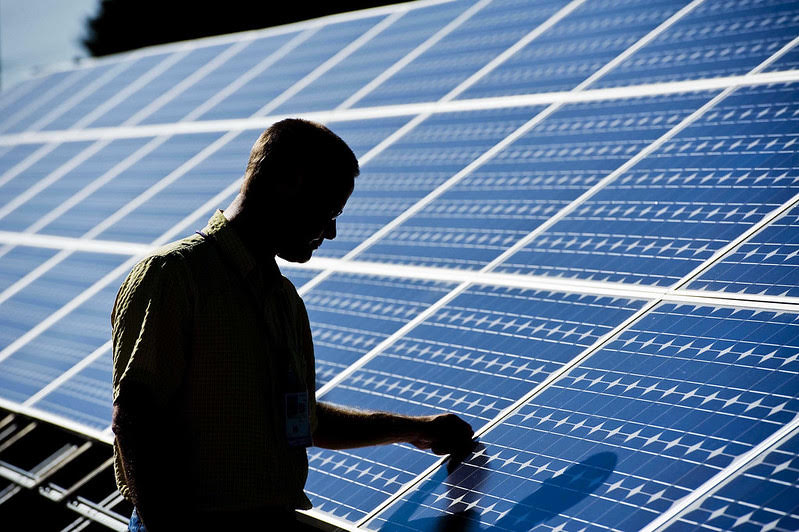
‘Electricity should be seen as a right, guaranteed to all, and provided free of charge. Yet, under our current system, for-profit energy companies set the prices to maximize profits to their shareholders, even when their users can’t afford the prices.’
The electric grid in the U.S. is a collection of all the power plants, transmission lines, wind and solar arrays, hydroelectric dams, and increasingly storage batteries, and other devices, working together to distribute electricity across the country. Electricity is a necessity for heating, cooling, refrigeration, cooking and medically-necessary equipment for some people.
Electricity should be seen as a right, guaranteed to all, and provided free of charge. Yet, under our current system, for-profit energy companies set the prices to maximize profits to their shareholders, even when their users can’t afford the prices.
Access to essential utilities like power and water during extreme heat and cold can be a matter of life or death.
Today, nearly three million people have their electricity shut off annually because they cannot afford to pay monthly bills, according to the Energy Justice Lab. Roughly 20% of American households struggle to pay their energy bills at least once a year. In 2023, a report by USA Today found that 16% of households (21.12 million) were behind on energy bills, with the average national balance reaching a record $20.3 billion.
According to Food and Water Watch, the Center for Biological Diversity identified a dozen power companies with especially egregious track records on utility shutoffs due to inability to pay. These utilities, including giants like NextEra, Duke Energy, and Exelon, were responsible for 86% of reported shutoffs. From 2019 to 2021, these companies each spent an average $4.9 billion on dividends to shareholders.
They could have forgiven all the debt that led to shutoffs, and it would have cost them just 1% of the cash they gave to shareholders.
To lower prices for families, utilities could transition to cheaper renewable energy. Instead, they lobby against pro-renewable policies and cling to fossil fuel assets. They pay politicians to ridicule renewable forms of energy, using lies about climate change to influence the public debate.
Wisconsin groups such as North Side Rising, Citizen Action of Wisconsin, Wisconsin Green Muslims and Faith in Place circulated an open letter to the We Energies Board of Directors that called for a commitment “to dramatically decreasing the number of electric shutoffs” and for measures to reduce rates, weatherize old homes and provide energy efficient alternatives such as solar to Milwaukee homes. (Reported by Milwaukeens.org)
The state of Virginia passed the Emergency Utilities Protection Act last year, which ensures that essential utility services, both water and electricity, “remain a right, not a privilege, during the moments when they are needed most,” said state legislator Irene Shin, who helped introduce the legislation.
The legislation received support from a diverse group of advocates, including Virginia Poverty Law Center, Virginia Organizing, Appalachian Voices, New Virginia Majority, Climate Action Alliance of the Valley, Virginia Interfaith Power & Light, Chesapeake Climate Action Network, and Clean Virginia.
For-profit energy companies also show they have no incentive to maintain their equipment safely, and power outages are often frequent. Maria Beltran, who lives in a neighborhood of older homes that are poorly insulated, sleeps with a continuous positive airway pressure, or CPAP, machine. This machine relies on electricity, and without it, Beltran fears what might happen after she goes to sleep. “I don’t want to die in the middle of night,” she said.
To maximize their profits, utilities hike rates to prolong the life of aging, dirty, dangerous and expensive infrastructure. PG&E in California is responsible for starting major wildfires because they did not maintain their equipment. One of the world’s largest battery energy storage system facilities, owned by Vistra, has had repeated fires in Moss Landing, California, spreading pollution over a wide area. A lawsuit has been filed that claims Vistra knowingly housed dangerous lithium-ion batteries in unsafe conditions, prioritizing profits over public safety. Meanwhile, customers pay the costs and face devastating losses to life and property.
It doesn’t have to be this way. Safe electricity could be provided, free of charge to all residences if it was made a public resource, and not maintained as a private profit-making entity.
Much more renewable energy could be replacing climate-crisis-causing fossil fuels. New technologies are being developed that promise to make the grid more efficient and better able to make use of renewable energy. It is possible to provide electricity where it has not been profitable before. The grid is old and in need of major upgrading to prevent blackouts and integrate the use of the newest technology.
All of these goals can be accomplished, but only if they are consistently and fairly managed for the interests of everyone through the public ownership of the power grid.
We can’t depend on for-profit companies to control socially necessary resources like electricity in a way that is cost-effective, safe and beneficial to society. Their primary concern is maximum profit, not meeting human needs.
Public ownership and control could eliminate the corporate private profits now driving the current system, making electricity free for all. The funds required for such a huge project on this large of a scale are available if we re-order our nation’s priorities, putting human needs first.
Karel Riley works with the People’s Tribune, and its bilingual sister publication, Tribuno del Pueblo, as a writer and contributor on human rights and women’s issues. “I’ve been a feminist since early adulthood. As a clerical worker, I joined a union drive with AFSCME seeking comparable wages to men for female-dominated jobs, and we were partially successful. In the mid-80’s our union participated in the historic Hormel strike in Minnesota. Later, I joined others in support of a local welfare rights organization,” she says.

